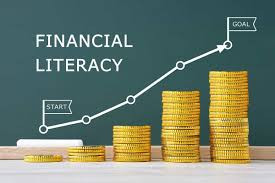
Globally, financial literacy levels remain low, especially in developing countries, where economic volatility, limited access to formal financial services and low levels of education intensify the challenge (Atkinson & Messy, 2012).
Be that as it may, Zimbabwe as a developing country presents a somewhat different scenario. Its socio-economic landscape presents a paradox: whilst a significant majority of its population is 93,2% academically literate — between 70% and 76% — is financially illiterate. This is not only a paradox. It is outrageous.
This disconnect underscores a critical challenge in harnessing human capital for sustainable development, wealth creation, generational wealth sustenance, poverty alleviation and the development of resilient communities.
Academic literacy, which encompasses reading, writing and basic numeracy, is often a prerequisite for effective financial literacy, yet it does not guarantee financial competence.
Financial literacy involves understanding and applying financial principles to make informed decisions about saving, investing, borrowing and managing risks.
The World Bank estimates that only about 10% to 15% of Zimbabweans have access to formal financial services, reinforcing the gap in financial literacy and asset building. The hyperinflation that affected Zimbabwe’s economy in the late 2000s wiped out savings for many. This demonstrates the importance of financial literacy in preserving wealth. Families that lacked knowledge about inflation, hedging or investment options suffered the most.
However, the 2023 Financial Literacy Report provides a summary of various financial literacy initiatives by the Reserve Bank of Zimbabwe and other stakeholders as part of the implementation of the National Financial Inclusion Strategy (NFIS) II. This was implemented during the period January to December 2023.
The NFIS II (2022 to 2026) “seeks to empower Zimbabweans and facilitate the financial capability of the underserved through high quality financial knowledge and skills. This is expected to influence consumer attitude and behaviour towards financial matters, as well as facilitate informed financial decisions.”
- Zim has 2nd highest rising food prices: WB
- 'Market discipline difficult to maintain'
- Govt policy unpredictability destroying formal economy
- UZ fiasco shows govt is aloof
Keep Reading
This instalment explores the implications of high financial illiteracy in Zimbabwe within the context of generational wealth creation and poverty alleviation. It examines the causes and consequences of this disparity, the importance of financial literacy in socio-economic development and proposes strategic interventions to bridge this gap.
Ultimately, enhancing financial literacy is vital for empowering individuals and families to build sustainable wealth, break cycles of poverty and foster resilient communities.
Zim’s socio economic challenges
Over the past decades, Zimbabwe has faced profound economic challenges, including, but not restricted to hyperinflation, currency instability, unemployment and limited access to financial services. Despite these hardships, the country's population continues to exhibit high levels of academic literacy, suggesting a potential for economic empowerment if financial literacy could be effectively integrated into educational and community frameworks.
Be that as it may, the persistence of financial illiteracy hampers individual and collective efforts to build wealth. Without the knowledge to navigate financial systems, many Zimbabweans are vulnerable to exploitative practices, poor financial decisions and cyclical poverty.
Recognising this gap is crucial for designing policies and programmes aimed at socio economic resilience.
Digital platform outcomes in Zimbabwe are not encouraging either. Those with “influence” having hundreds of thousands of followers, even up to millions, do the opposite.
There is no message of frugality that they share. Instead, the messages are pregnant with images of conspicuous consumption and primitive accumulation. This is happening across the board from the academically educated, to those with less education.
Financial literacy in wealth creation
A March 2025 study by Slock Panthi titled The Influence of Financial Literacy on Wealth Accumulation and Financial Stability Among Blue-Collar Workers in Nepal, found a positive correlation between financial literacy and wealth accumulation and financial stability.
Workers with higher financial literacy tended to manage their finances more effectively by saving more, investing wisely, and controlling debt efficiently. Although the study did not directly examine its impact on poverty reduction, it is reasonable to infer that improved financial management skills can contribute to lowering poverty levels.
Financial literacy enables wealth creation and poverty reduction in several ways as follows:
Enabling informed financial decisions: Financial literacy equips individuals with the skills to make informed decisions regarding income management, expenditures, savings, investments and debt. In Zimbabwe, where informal savings groups and micro-finance services are vital, understanding how to access and utilise these resources effectively, could significantly impact wealth accumulation;
Promoting entrepreneurship and income generation: A financially literate population is more likely to engage in entrepreneurial activities, access credit and manage business finances effectively. Given Zimbabwe's entrepreneurial spirit, especially among youth and women, financial literacy can catalyse micro, small and medium enterprise (MSME) growth, creating jobs and reducing poverty;
Facilitating sustainable wealth building: Long term wealth creation requires disciplined savings, prudent investment, and risk management. Financial literacy fosters these behaviours, enabling individuals to plan for retirement, education and unforeseen emergencies, thereby breaking the cycle of financial vulnerability;
Enhancing financial inclusion: Many Zimbabweans remain outside formal financial systems due to lack of knowledge and justifiable mistrust of the banking sector. Financial literacy promotes inclusion by empowering individuals to utilise banking, insurance, and digital financial services, expanding access to capital and social safety nets.
Financial literacy
Educational system gaps: While academic literacy is high, financial education is often absent from the school curricula. As a result, students graduate without practical knowledge of managing personal finances, investments or credit;
Cultural and social factors: Financial behaviours are influenced by cultural norms, familial values, misconceptions and myths. In Zimbabwe, some communities lack awareness of financial products and harbour mistrust towards formal financial institutions, given what happened in the past where citizens woke up to find their accounts wiped;
Limited access to financial services: Despite advancements, many rural and marginalised communities have limited access to banking and financial services, reducing opportunities for practical financial learning and engagement;.
Economic instability and hyperinflation: Persistent economic crises undermine the value of financial education, as rapid currency devaluation and inflation distort perceptions of saving and investment, making financial planning complicated and complex.
Generational wealth creation
Inter-generational poverty: With approximately 76% of Zimbabweans being financially illiterate, many families find it difficult to build and sustain wealth across generations. For example, in rural areas such as Mashonaland or Manicaland, families often rely heavily on subsistence farming. A typical story involves a family selling part of their productive land or livestock during tough times without understanding how to reinvest or save for future needs. Consequently, assets are depleted, and future generations inherit minimal resources;
Limited asset building: Building assets like property, requires disciplined financial planning, skills that many Zimbabweans lack. According to the Zimbabwe National Statistics Agency, only about 16% of households own formal property, partly due to a lack of understanding of credit, mortgages or savings plans. For example, a young Zimbabwean entrepreneur in Harare attempted to expand his small business but lacked knowledge of formal banking or credit options. Instead, he borrowed from informal lenders at exorbitant rates, leading to debt spirals and preventing asset accumulation. Many families sell productive assets prematurely, such as livestock or land, to cover immediate expenses, eroding the base for future wealth;
Reduced opportunities for wealth transfer: Estate planning is often overlooked because of limited financial literacy. Many Zimbabweans die without wills, leading to assets being tied up in legal disputes or lost. For example, in 2022, a prominent businessman in Bulawayo passed away without formal estate arrangements, resulting in a lengthy and costly legal battle over his property. In rural Zimbabwe, elders often inherit land informally, but without proper documentation or a will, with their heirs risking losing access when disputes arise or assets are seized by authorities due to unclear ownership. This hampers the transfer of wealth and diminishes the economic stability of future generations.
Conclusion
The high levels of academic literacy juxtaposed with widespread financial illiteracy present a paradox that hampers the nation’s socio-economic progress. Without financial literacy, opportunities for wealth creation remain limited and poverty persists across generations. Addressing this challenge requires a multi stakeholder approach that integrates financial education into formal schooling, community programmes and digital platforms.
Ndoro-Mkombachoto is a former academic & banker. She is a founder of GBA PLC & co-founder of Sustainwise Strategies PLC, where she has consulted widely in strategy, entrepreneurship & private sector development, ESG, financial education,etc, for organisations that include, amongst others, Seed Co Africa, SeedCo Zimbabwe, Hwange Colliery, RBZ/CGC, Standard Bank of SA, Home Loans, IFC/World Bank, UNDP, USAid, Danida, CIDA, Kellogg Foundation. She is a writer & entrepreneur in the property & lifestyle sectors. She is the current Chairperson of NetOne Financial Services PLC, a subsidiary of NetOne Telecommunications. Follow Gloria on YouTube @HeartfeltwithGloria or contact her on gloria@sustainwisestrategies.co.za






